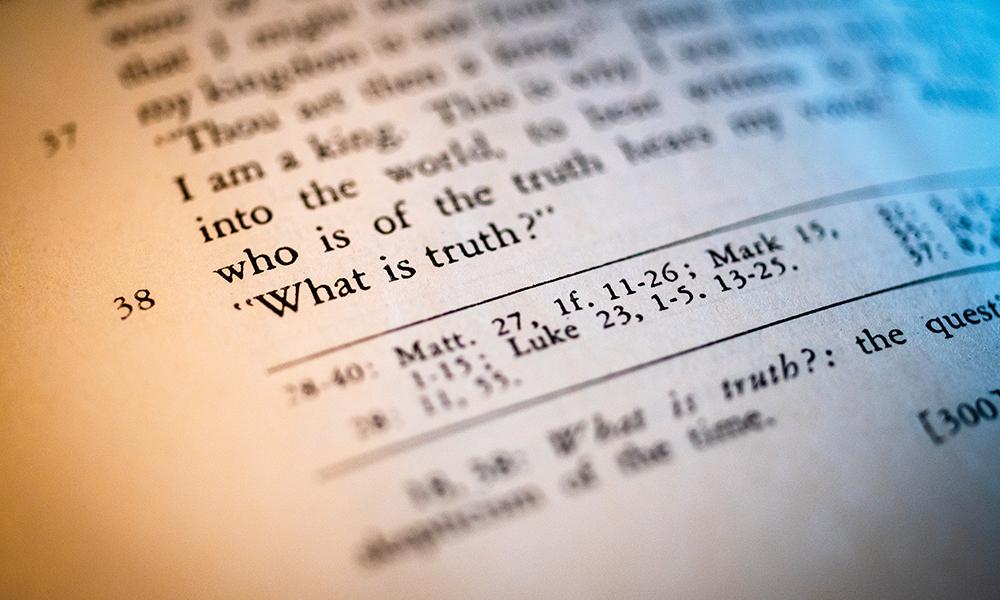
A question for the ages
If you are a young adult attempting to live the faith you profess on Sundays, of this you can be sure: There will come a time (or two or 20) in your life when the proverbial rubber will meet the road. Maybe it already has. At such times, a very useful question to ask yourself is, “What is my best next step?” (Notice the word “my” in that question. Your chosen next step might look very different from someone else’s.) After having chosen your next step, you might then wonder, “But is my choice the right one?” As you dig deeper to answer that question, you’ll find that your guiding light is what you believe to be the Truth of the situation.
If you are a young adult attempting to live the faith you profess on Sundays, of this you can be sure: There will come a time (or two or 20) in your life when the proverbial rubber will meet the road. Maybe it already has. At such times, a very useful question to ask yourself is, “What is my best next step?” (Notice the word “my” in that question. Your chosen next step might look very different from someone else’s.) After having chosen your next step, you might then wonder, “But is my choice the right one?” As you dig deeper to answer that question, you’ll find that your guiding light is what you believe to be the Truth of the situation.
“Quid est veritas?” (“What is Truth?”)
With Lent still relatively visible in the rearview mirror, this phrase spoken by Pilate to Jesus rings very familiar, but it is relevant for us year-round and life-long. If Pilate could have turned to sources like the dictionary (Oxford and Merriam-Webster) and Wikipedia, he would have found these answers to his question:
- Truth is the true facts about something, rather than things that have been invented or guessed.
- Truth is a transcendent fundamental or spiritual reality.
- Truth is the property of being in accord with fact or reality.
Delving next into the myriad opinion pieces on the subject, Pilate could have read about truth being personal and the importance of owning his truth. We hear quite a bit these days about personal truth, speaking your truth, and living in your truth. Comparing these uses of the word with the above examples from the dictionary, it appears that we are dealing with two different concepts: “YOUR” truth versus “THE” Truth.
Every young adult who walks into my therapy office is seeking something such as better relationships or healing after a traumatic event. We spend time talking about family, strengths, and areas on which they might need to work. No matter what you are seeking, these are important things to think about because they add up to what you might call “your” truth, which means your experiences, opinions, feelings, morals, and all the other things that currently make you you. However, these things can change with the ebb and flow of life, no matter how certain we feel about them at this moment. These changes can leave us feeling not only adrift, but adrift without a paddle or a compass. News flash: “WE ALL NEED A COMPASS!”
This is where the Lord comes to our rescue. As Catholics, we believe that the Truth is not subjective; rather, there exist realities that reflect God and are of His design. God also tells us through scripture that His Truth, also known as the Truth, never changes. (Jas 1:17, Heb 13:8) When we have questions about the Truth of a situation, we can go to the Source by praying, delving into the Scriptures and the Catechism, and maybe talking to a priest or a faithful Catholic loved one. After all, God has also told us that if we seek, we will find. (Mt 7:7) This life will certainly have its challenges, no matter our chosen vocation. Using the truths laid out for us through God’s Church as our compass, we can be guided through tumultuous waters, and ultimately, brought safely home.
Cathy Altonji is a therapist at Catholic Family Services in Huntsville. She has a master’s degree in social work and is a licensed independent clinical social worker certified in private independent practice.



